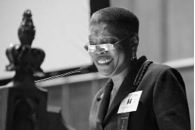The Circle Expanded
At the Winter Roundtable, psychologist Rosie Bingham explores the theme of inclusion
The Circle Expanded
At the Winter Roundtable, psychologist Rosie Bingham explores the theme of inclusion“I was born, whole and perfect, in the hospital near the plantation in Mississippi, where I was a little colored girl.”
So began the Janet E. Helms Award Lecture, “25 Years Later: How Big Is The Circle Of Inclusion?” delivered by Rosie P. Bingham at TC’s 25th Annual Winter Roundtable on Cultural Psychology—a gathering of graduate and undergraduate students, counselors, psychologists, educators, social workers, psychiatrists and administrators.
Bingham is Vice President for Student Affairs at the University of Memphis and a nationally recognized leader in the field of psychology. She has served as president of three national professional organizations—the Association of University and College Counseling Center Directors, the International Association of Counseling Services, and the Society of Counseling Psychology of the American Psychological Association.
As the recipient of the Janet E. Helms Award for Mentoring and Scholarship, Bingham reflected on 25 years of change in cultural psychology and education through the frame of her own personal and professional odyssey as an African American woman struggling to find her way “through the maze of what it means to be a black American.”
Bingham recalled her escape from the narrow confines of a segregated childhood in the Deep South to the wide-open spaces of campus life in the 1960s. “I learned that all white people weren’t smart,” she said. “I learned, ‘Say it loud, you’re black and you’re proud!’ My hair went from pressed to the biggest Afro I could manage.”
In reviewing the scholarly literature of the past 25 years, Bingham found a surge in the number and sophistication of articles on multiculturalism, race and ethnicity, and more modest gains in research devoted to class and sexual orientation. Those trends were evident in the program for this year’s roundtable, which featured papers, workshops and symposia with such titles as “Creating Successful Cross-Racial Therapy Relationships,” “Intersections of Multiple Oppressed Identities,” and “The Future for Education and Psychology: Working with Transgender Individuals.” The texts on display at the book exhibit ranged from “Feminist Therapy: Theory and Practice” to “Counseling across Cultures.”
“The primary goals of this year’s conference were to highlight and celebrate the incredible contributions that have been made to the fields of cultural psychology and education over the past 25 years,” says Madonna G. Constantine, Professor of Psychology and Education and Director of the Roundtable. “There has been a plethora of novel and ground-breaking theory, research and practice introduced into these fields over the past two and a half decades, and this information has resulted in educators and practitioners becoming much more competent to meet the needs of a rapidly diversifying U.S. society.”
The roundtable sessions included both traditional lectures and small-group discussions. As with Bingham’s talk, anecdote and personal experience were common currency—but always as distilled through the prism of research.
Satiba Campbell, a doctoral candidate in social psychology at the University of Delaware who attended a workshop on participatory action research, said she appreciated that approach. “Often, we just send out surveys,” she said on her research prior to attending the Roundtable. “It’s always good to see your work applied.”
At a session on the topic of mentoring African American women in academia, participants shared their personal experiences of grappling with the barriers of race, age and gender when seeking to mentor others or find mentors of their own. “I’m not crazy,” one graduate student said with a sigh of relief. “Other people are going through this, too.” And a symposium on spiritual and ethical competence in counselor training sparked a spirited debate over the ethics of referring a client to another psychological counselor when the client’s behavior contravenes your own religious beliefs. “We don’t have the luxury of choosing our clients,” said co-presenter Vivian J. McCollum, of Albany State University—though some audience members wondered what kind of damage a therapist could do in such a situation by not referring the client to someone else.
Such conversations often raised more questions than they answered. That, too, was consistent with Bingham’s overall assessment of the field—an assessment that acknowledged signs of real progress while highlighting the persistence of high dropout rates among minorities, the need for more research on class and sexual orientation, and the ongoing discrimination and racism evident throughout American society.
“We can see that there has been a lot of change,” Bingham said. “But we can see that not everyone is included. I hope that in another 25 years, the circle will be a lot larger.”
Published Tuesday, May. 6, 2008
